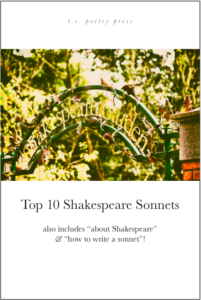< Return to All 154 William Shakespeare Sonnets
Sonnet 1 (I)
From fairest creatures we desire increase,
That thereby beauty’s rose might never die,
But as the riper should by time decease,
His tender heir might bear his memory:
But thou, contracted to thine own bright eyes,
Feed’st thy light’st flame with self-substantial fuel,
Making a famine where abundance lies,
Thyself thy foe, to thy sweet self too cruel.
Thou that art now the world’s fresh ornament
And only herald to the gaudy spring,
Within thine own bud buriest thy content
And, tender churl, makest waste in niggarding.
Pity the world, or else this glutton be,
To eat the world’s due, by the grave and thee.
BUY ‘HOW TO WRITE A FORM POEM’ NOW!
About William Shakespeare
William Shakespeare, the “Bard of Avon,” was an English poet and playwright and is generally considered to be the greatest English-language writer. He was born in 1564 in Stratford-Upon-Avon and married Anne Hathaway at the age of 18. He and Anne had three children.
By the late 1500s, Shakespeare was working as an actor and playwright in London, eventually building a theatre (The Globe) on the Thames River with his business partners.
Shakespeare is credited with authoring 38 plays including tragedies Hamlet, Macbeth and Romeo and Juliet as well as comedies A Midsummer Night’s Dream and Much Ado About Nothing. He also wrote 154 sonnets (hence the Shakespearean sonnet style) and a pair of narrative poems. Because little is known of his personal history, and because of his limited academic credentials, speculation has arisen from time to time as to the actual authorship of work credited to him.
William Shakespeare died in 1616, leaving behind a long legacy of poems and plays, many of which have been re-imagined in a variety of forms.

